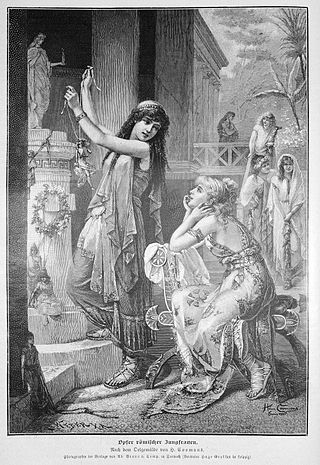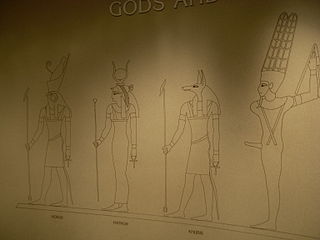Religions et religion was an 1880 political tract by Victor Hugo supporting belief in God but attacking organized religion.
Religions et religion was an 1880 political tract by Victor Hugo supporting belief in God but attacking organized religion.

The Baháʼí Faith is a religion founded in the 19th century that teaches the essential worth of all religions and the unity of all people. Established by Baháʼu'lláh, it initially developed in Iran and parts of the Middle East, where it has faced ongoing persecution since its inception. The religion is estimated to have five to eight million adherents, known as Baháʼís, spread throughout most of the world's countries and territories.
Hinduism is an Indian religion or dharma, a religious and universal order or way of life by which followers abide. As a religion, it is the world's third-largest, with approximately 1.2 billion followers, or 15% of the global population, known as Hindus. The word Hindu is an exonym and while Hinduism has been called the oldest religion in the world, it has also been described as sanātana dharma, a modern usage, based on the belief that its origins lie beyond human history, as revealed in the Hindu texts. Another endonym is Vaidika Dharma, the dharma related to the Vedas.

Hindus are people who religiously adhere to Hinduism. Historically, the term has also been used as a geographical, cultural, and later religious identifier for people living in the Indian subcontinent.

Muslims are people who adhere to Islam, a monotheistic religion belonging to the Abrahamic tradition. They consider the Quran, the foundational religious text of Islam, to be the verbatim word of the God of Abraham as it was revealed to Muhammad, the main Islamic prophet. Alongside the Qur'an, Muslims also believe in previous revelations, such as the Tawrat, the Zabur (Psalms), and the Injeel (Gospel). These earlier revelations are also associated with Judaism and Christianity, which are regarded by Muslims as earlier versions of Islam. The majority of Muslims also follow the teachings and practices attributed to Muhammad (sunnah) as recorded in traditional accounts (hadith).

Paganism is a term first used in the fourth century by early Christians for people in the Roman Empire who practiced polytheism, or ethnic religions other than Judaism. In the time of the Roman Empire, individuals fell into the pagan class either because they were increasingly rural and provincial relative to the Christian population, or because they were not milites Christi. Alternative terms used in Christian texts were hellene, gentile, and heathen. Ritual sacrifice was an integral part of ancient Graeco-Roman religion and was regarded as an indication of whether a person was pagan or Christian. Paganism has broadly connoted the "religion of the peasantry".
Religion is a range of social-cultural systems, including designated behaviors and practices, morals, beliefs, worldviews, texts, sanctified places, prophecies, ethics, or organizations, that generally relate humanity to supernatural, transcendental, and spiritual elements—although there is no scholarly consensus over what precisely constitutes a religion. Different religions may or may not contain various elements ranging from the divine, sacredness, faith, and a supernatural being or beings.
Secularism is the principle of seeking to conduct human affairs based on naturalistic considerations, uninvolved with religion.

Zoroastrianism, also known as Mazdayasna and Behdin, is an Iranian religion and one of the world's oldest organized faiths, based on the teachings of the Iranian-speaking prophet Zoroaster. It has a dualistic cosmology of good and evil within the framework of a monotheistic ontology and an eschatology which predicts the ultimate conquest of evil by good. Zoroastrianism exalts an uncreated and benevolent deity of wisdom known as Ahura Mazda as its supreme being and Angra Mainyu as the opposing, destructive spirit and adversary to Ahura Mazda. Historically, the unique features of Zoroastrianism, such as its monotheism, messianism, belief in free will and judgement after death, conception of heaven, hell, angels, and demons, among other concepts, may have influenced other religious and philosophical systems, including the Abrahamic religions and Gnosticism, Northern Buddhism, and Greek philosophy.

The historical Vedic religion constituted the religious ideas and practices prevalent amongst the Indo-Aryan peoples of the northwest Indian subcontinent during the Vedic period. These ideas and practices are found in the Vedic texts, and some Vedic rituals are still practiced today. It is one of the major traditions which shaped Hinduism, though present-day Hinduism is significantly different from the historical Vedic religion.

A state religion is a religion or creed officially endorsed by a sovereign state. A state with an official religion, while not a secular state, is not necessarily a theocracy. State religions are official or government-sanctioned establishments of a religion, but the state does not need to be under the control of the clergy, nor is the state-sanctioned religion necessarily under the control of the state.
Irreligion is the neglect or active rejection of religion and, depending on the definition, a simple absence of religion.
The world's principal religions and spiritual traditions may be classified into a small number of major groups, though this is not a uniform practice. This theory began in the 18th century with the goal of recognizing the relative levels of civility in different societies, but this practice has since fallen into disrepute in many contemporary cultures.

Religion in China is diverse and most Chinese people are either non-religious or practice a combination of Buddhism and Taoism with a Confucian worldview, which is collectively termed as Chinese folk religion.

The traditional beliefs and practices of African people are highly diverse, including various ethnic religions. Generally, these traditions are oral rather than scriptural and are passed down from one generation to another through folk tales, songs, and festivals, and include beliefs in spirits and higher and lower gods, sometimes including a supreme being, as well as the veneration of the dead, and use of magic and traditional African medicine. Most religions can be described as animistic with various polytheistic and pantheistic aspects. The role of humanity is generally seen as one of harmonizing nature with the supernatural.

Scientology is a set of beliefs and practices invented by the American author L. Ron Hubbard, and an associated movement. It is variously defined as a cult, a business, or a new religious movement. Hubbard initially developed a set of ideas that he called Dianetics, which he represented as a form of therapy. An organization that he established in 1950 to promote it went bankrupt, and Hubbard lost the rights to his book Dianetics in 1952. He then recharacterized his ideas as a religion, likely for tax purposes, and renamed them Scientology. By 1954, he had regained the rights to Dianetics and founded the Church of Scientology, which remains the largest organization promoting Scientology. There are practitioners independent of the Church, in what is called the Free Zone. Estimates put the number of Scientologists at under 40,000 worldwide.
The Abrahamic religions are a group of religions, most notably Judaism, Christianity and Islam, centered around the worship of the God of Abraham. Abraham, a Hebrew patriarch, is extensively mentioned in the religious scriptures of the Hebrew and Christian Bibles, and the Quran.
Atheism, in the broadest sense, is an absence of belief in the existence of deities. Less broadly, atheism is a rejection of the belief that any deities exist. In an even narrower sense, atheism is specifically the position that there are no deities. Atheism is contrasted with theism, which in its most general form is the belief that at least one deity exists.

Polytheism is the belief and worship in multiple deities or spirits, which are usually assembled into a pantheon of gods and goddesses, along with their own religious sects and rituals. Polytheism is a type of theism. Within theism, it contrasts with monotheism, the belief in a singular God who is, in most cases, transcendent. In religions that accept polytheism, the different gods and goddesses may be representations of forces of nature or ancestral principles; they can be viewed either as autonomous or as aspects or emanations of a creator deity or transcendental absolute principle, which manifests immanently in nature. Polytheists do not always worship all the gods equally; they can be in monolatrists or kathenotheists, specializing in the worship of one particular deity only or at certain times (respectively).
In religious studies and folkloristics, folk religion, popular religion, traditional religion or vernacular religion comprises various forms and expressions of religion that are distinct from the official doctrines and practices of organized religion. The precise definition of folk religion varies among scholars. Sometimes also termed popular belief, it consists of ethnic or regional religious customs under the umbrella of a religion; but outside official doctrine and practices.